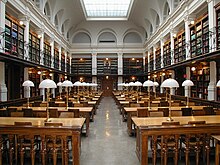Education
Education is about learning skills and knowledge. It also means helping people to learn how to do things and support them to think about what they learn. It is also important for educators to teach ways to find and use information. Education needs research to find out how to make it better.[1][2]
Through education, the knowledge of society, country, and of the world is passed on from generation to generation. This may include education in morality, for example learning how to act as loyal, honest and effective citizen.

Education may help and guide individuals from one class to another. Educated people and groups can do things like help less-educated people and encourage them to get educated.


Types of education[change | change source]
There are different ways to categorize education: for example, by age or subject. One way is to divide it into formal education, non-formal education, and informal education.
Formal education is usually in school, where a person may learn basic, academic, or trade skills. Small children often attend a nursery or kindergarten but often formal education begins in elementary school and continues with secondary school. Post-secondary education (or higher education) is usually at a college or university which may grant an academic degree. Or, students may go to a City college where they learn practical skills. This way learners can become qualified to be plumbers, electricians, builders and similar occupations. These course have arrangements for students to get practical experience. Apprenticeship was the older way to do this,
Non-formal education includes adult basic education, adult literacy education or school equivalency preparation. In non-formal education, someone who is not in school can learn to read, write, and other basic life or job skills. Home education, individualized instruction (such as programmed learning), distance learning and computer-assisted instruction are other possibilities.[3]
Informal education is less organized.[4] It may be a parent (like a dad or mom) teaching a child how to make a meal or ride a bicycle. People can also get an informal education by reading many books from a library or educational websites. This may also be called self-education. Some famous people have been largely self-educated, like Alfred Russell Wallace.
Unschooling is when kids learn as they go and do not go to traditional school buildings. Instead, they go on websites, play games, or engage in normal hobbies and learn along the way. The experience of children with "unstructured" lives is that they get into trouble.[5]
Deschooling is a more drastic approach. It advocates abolishing schools. It was put forward in the USA of the 1960s and 1970s. It is no longer an active movement.
Schooling[change | change source]
Many public schools (U.S. terminology) provide a free education through the government. Parents may send their own children to a private school, but they must pay for it. In some poor places, some children cannot go to school, because their countries do not make education available, or because their families do not have enough money, or because the children have to work for money, or because the society has prejudice against education for girls.
There are primary schools and secondary schools. In many places they are government funded. Colleges and universities usually charge fees (tuition payments) which may be different in different countries.
Related pages[change | change source]
- Curriculum
- Distance education
- Homeschooling – education at home
- Pedagogy
- Inclusive education
- Special education – education of students who have a disability
- Subject (school)
- Right to education
- Studypool tips
References[change | change source]
- ↑ Anderson, Garry & Arsenault, Nancy 1998. Fundamentals of Educational Research. Routledge. ISBN 978-0-203-97822-1 [1]
- ↑ Gitomer, Drew H. & Bell, Courtney A. (eds) 2016. Handbook of research on teaching. AERA.
- ↑ U.S. Department of Education, Evaluation of evidence-based practices in online learning: a meta-analysis and review of online learning studies, 2010. [2]
- ↑ Rogoff, Barbara; Callanan, Maureen; Gutiérrez, Kris D.; Erickson, Frederick 2016. The organization of informal learning. Review of Research in Education 40: 356–401. [3]
- ↑ msnbc.com (2006-10-31). "Readers share heated opinions on 'unschooling'". msnbc.com. Retrieved 2020-09-05.
